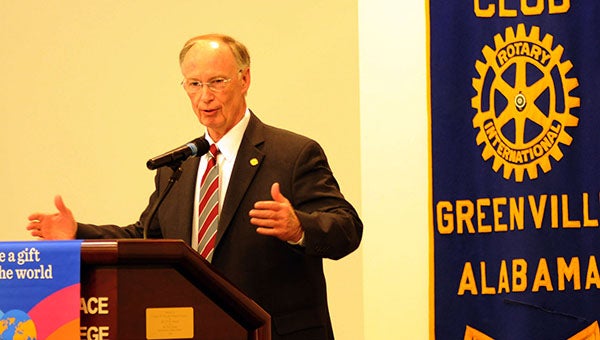Governor shares views on gambling with Rotary Club
Published 1:00 pm Friday, January 15, 2016

Gov. Robert Bentley served as the guest speaker at the Rotary Club of Greenville’s meeting Thursday at LBW Community College. Bentley shared about the items he will be discussing in his upcoming State of the State address. (Advocate Staff/Andy Brown)
With Alabamians driving to neighboring states such as Florida and Georgia in hopes of winning a portion of the record $1.6 billion Powerball lottery, Gov. Robert Bentley feels sure that when lawmakers open their session in February, a lottery for the state will once again be a hot topic.
And while Bentley, who drew criticism during the last legislative session for advocating for a $541 million tax increase, acknowledges that the state is in need of additional revenue sources, he does not believe a lottery is the answer.
“I think gambling is a poor way to fund government,” Bentley told the Rotary Club of Greenville Thursday at LBW Community College. “I’ve always thought that. I think we ought to step up to the plate and pay for what we have. I don’t think we should do it on the backs of the 30 to 40 percent of people who tend to gamble the most. Having said that, that’s what I believe, but I also believe in the peoples’ right to vote on issues. If the people of Alabama want to vote on a lottery, for instance, I’m not opposed to that and never have been opposed to that. I just think we all ought to pay for what we use. If we drive on a road, we ought to pay gas taxes. If we use services in the state, we ought to pay for them. And if you use services, you ought to pay for them and not ask everyone else in the state to pay for them. Even though I am not a supporter of the gambling, I am a supporter of the peoples’ right to vote on issues.”
Bentley went on to say that if a constitutional amendment is approved in Alabama that allows a lottery, he would like to see the revenue generated placed in the General Fund.
“If they can get it out of the Legislature, then people will be able to vote on it,” said Bentley. “My only desire is that the money goes to the General Fund, because that’s where the money’s needed the most.”
On Thursday, Bentley also touched on the state’s effort to recruit industry, and praised officials with the City of Greenville and Butler County for their work in attracting industries to the area.
“Local leadership is the most important leadership,” said Bentley. “I’ve often said we can recruit industries into this state, and we can do it because we’ve put in an organizational structure that allows us to do that, but the most important part of recruiting industry is that you have to sell your area. I can’t sell Greenville. Ya’ll sell Greenville, and ya’ll do a great job of that.”
Bentley specifically mentioned Greenville’s Tier I suppliers — Hwashin America and Hyundai Steel America, formerly known as Hysco — which are major suppliers for Montgomery’s Hyundai plant.
“Last year Hyundai produced 400,000 vehicles” he said. “That’s a lot of cars. If you take all of the automobiles produced in Alabama, we produced more than a million. That puts Alabama as the second largest producer of automobiles in the country. When we are second or third in producing the number of automobiles, which is major because 20 years ago we were producing zero. We have come a long way in this state in the automotive industry.”
Bentley credits an improving school system, which has helped improve the state’s workforce, as a key factor in the state’s economic growth.
He specifically touted the state’s two-year college system, which includes LBW Community College, and the state’s Pre-K program.
“Education is the key,” said Bentley. “It’s always the key. Education starts early. I am convinced, more so now than ever before, that the most important part of education is giving a child a good foundation.”
Currently, Alabama’s First Class Voluntary Pre-Kindergarten Program is in 20 percent of the schools in the state. Butler County is home to eight of the state’s nationally recognized Pre-K programs.
Bentley said that he would like to see that program grow during his final three years in office, and he plans to make sure the funding is available to make that happen. He said each year, the state has increased funding for the program by $10 million. He said this year, he will ask for an increase of $20 million.
“Pre-K works,” he said. “We need to continue to push that.”





